An Analysis of Whanau Ora and Its Impact on Maori Management
VerifiedAdded on 2023/03/17
|15
|3433
|49
Report
AI Summary
This report provides a comprehensive analysis of Whanau Ora, a significant indigenous health initiative in New Zealand, originating from Maori culture. It examines the policy framework, philosophy, and practical applications of Whanau Ora, emphasizing its focus on enhancing individual wellbeing ...
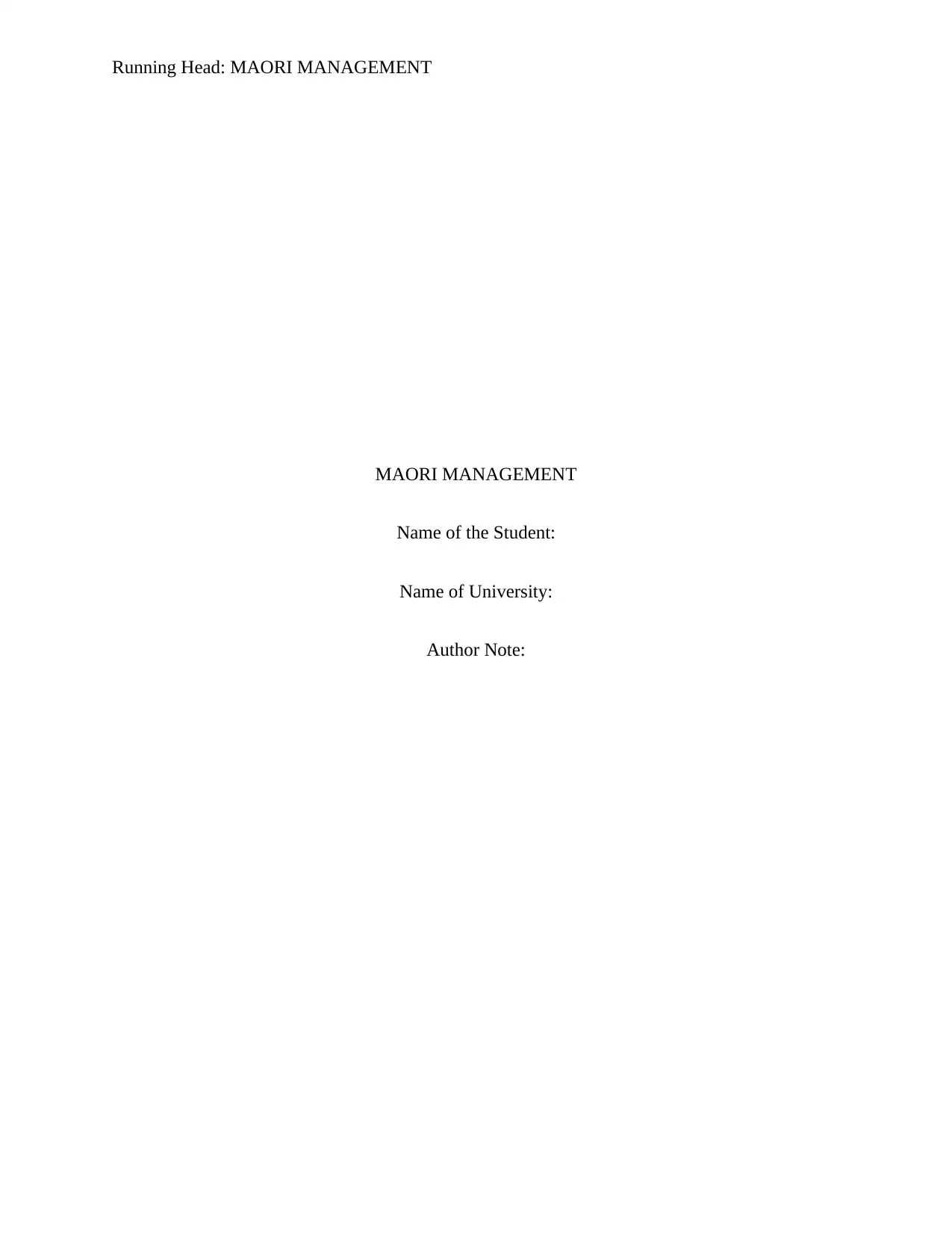
Running Head: MAORI MANAGEMENT
MAORI MANAGEMENT
Name of the Student:
Name of University:
Author Note:
MAORI MANAGEMENT
Name of the Student:
Name of University:
Author Note:
Paraphrase This Document
Need a fresh take? Get an instant paraphrase of this document with our AI Paraphraser
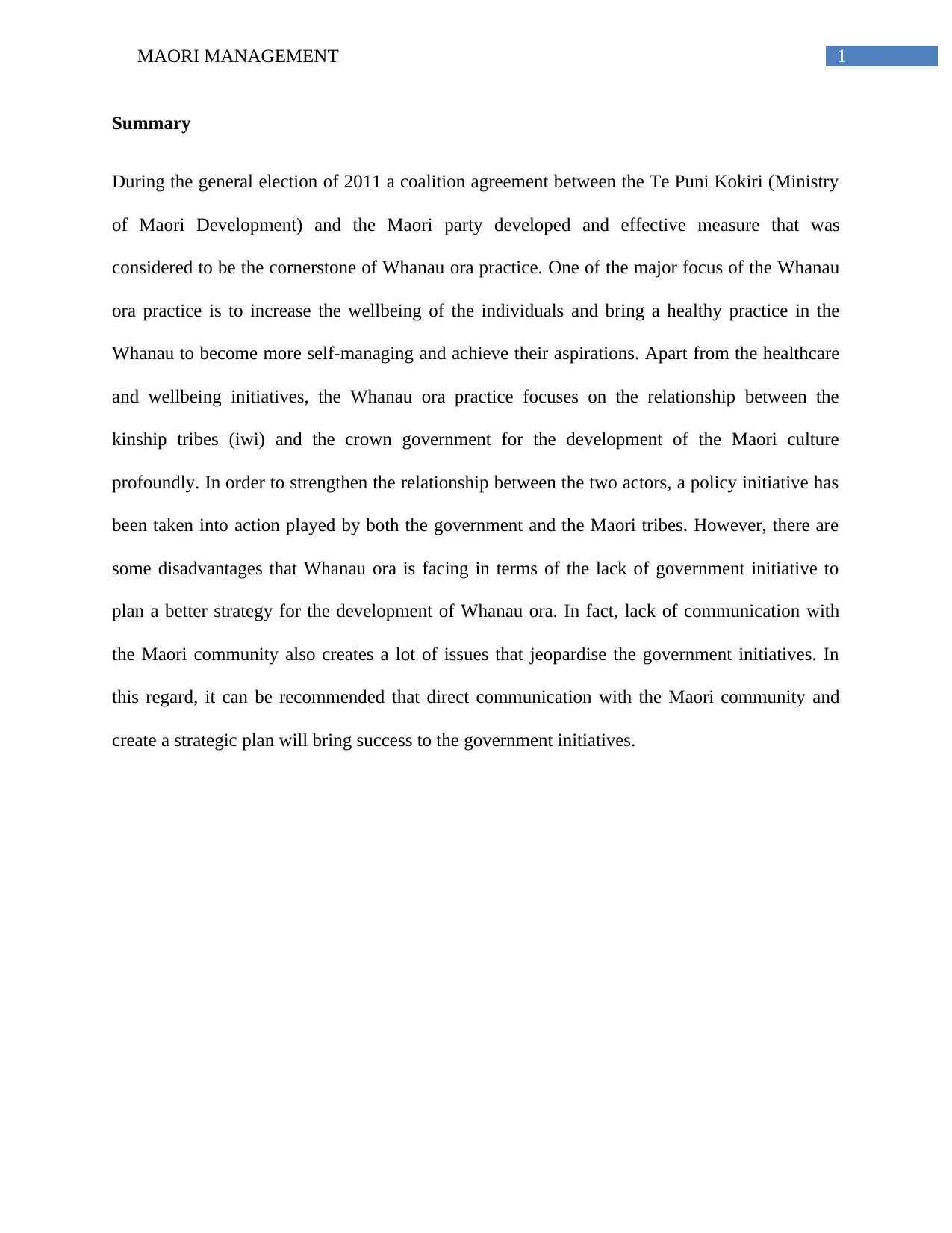
1MAORI MANAGEMENT
Summary
During the general election of 2011 a coalition agreement between the Te Puni Kokiri (Ministry
of Maori Development) and the Maori party developed and effective measure that was
considered to be the cornerstone of Whanau ora practice. One of the major focus of the Whanau
ora practice is to increase the wellbeing of the individuals and bring a healthy practice in the
Whanau to become more self-managing and achieve their aspirations. Apart from the healthcare
and wellbeing initiatives, the Whanau ora practice focuses on the relationship between the
kinship tribes (iwi) and the crown government for the development of the Maori culture
profoundly. In order to strengthen the relationship between the two actors, a policy initiative has
been taken into action played by both the government and the Maori tribes. However, there are
some disadvantages that Whanau ora is facing in terms of the lack of government initiative to
plan a better strategy for the development of Whanau ora. In fact, lack of communication with
the Maori community also creates a lot of issues that jeopardise the government initiatives. In
this regard, it can be recommended that direct communication with the Maori community and
create a strategic plan will bring success to the government initiatives.
Summary
During the general election of 2011 a coalition agreement between the Te Puni Kokiri (Ministry
of Maori Development) and the Maori party developed and effective measure that was
considered to be the cornerstone of Whanau ora practice. One of the major focus of the Whanau
ora practice is to increase the wellbeing of the individuals and bring a healthy practice in the
Whanau to become more self-managing and achieve their aspirations. Apart from the healthcare
and wellbeing initiatives, the Whanau ora practice focuses on the relationship between the
kinship tribes (iwi) and the crown government for the development of the Maori culture
profoundly. In order to strengthen the relationship between the two actors, a policy initiative has
been taken into action played by both the government and the Maori tribes. However, there are
some disadvantages that Whanau ora is facing in terms of the lack of government initiative to
plan a better strategy for the development of Whanau ora. In fact, lack of communication with
the Maori community also creates a lot of issues that jeopardise the government initiatives. In
this regard, it can be recommended that direct communication with the Maori community and
create a strategic plan will bring success to the government initiatives.
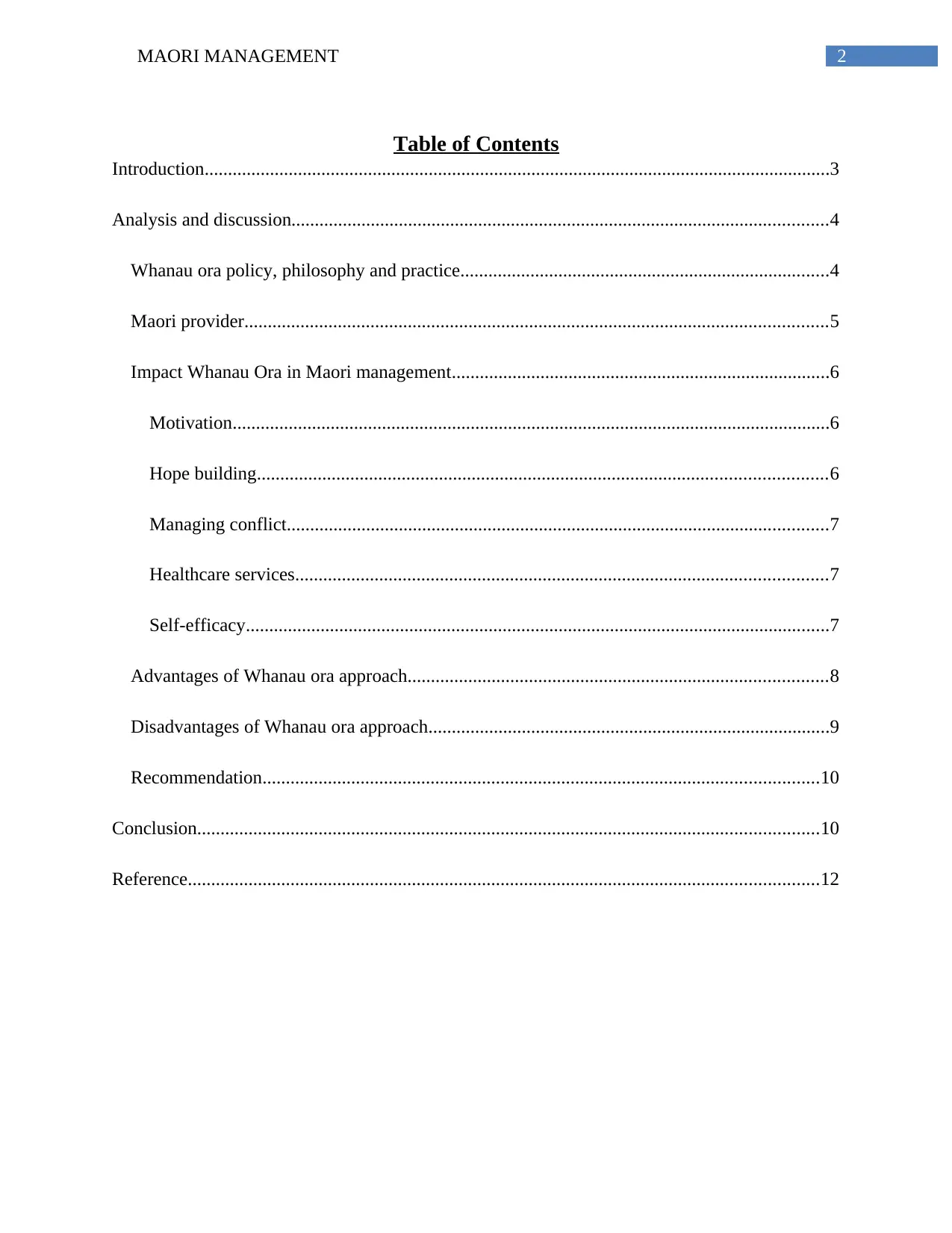
2MAORI MANAGEMENT
Table of Contents
Introduction......................................................................................................................................3
Analysis and discussion...................................................................................................................4
Whanau ora policy, philosophy and practice...............................................................................4
Maori provider.............................................................................................................................5
Impact Whanau Ora in Maori management.................................................................................6
Motivation................................................................................................................................6
Hope building..........................................................................................................................6
Managing conflict....................................................................................................................7
Healthcare services..................................................................................................................7
Self-efficacy.............................................................................................................................7
Advantages of Whanau ora approach..........................................................................................8
Disadvantages of Whanau ora approach......................................................................................9
Recommendation.......................................................................................................................10
Conclusion.....................................................................................................................................10
Reference.......................................................................................................................................12
Table of Contents
Introduction......................................................................................................................................3
Analysis and discussion...................................................................................................................4
Whanau ora policy, philosophy and practice...............................................................................4
Maori provider.............................................................................................................................5
Impact Whanau Ora in Maori management.................................................................................6
Motivation................................................................................................................................6
Hope building..........................................................................................................................6
Managing conflict....................................................................................................................7
Healthcare services..................................................................................................................7
Self-efficacy.............................................................................................................................7
Advantages of Whanau ora approach..........................................................................................8
Disadvantages of Whanau ora approach......................................................................................9
Recommendation.......................................................................................................................10
Conclusion.....................................................................................................................................10
Reference.......................................................................................................................................12
⊘ This is a preview!⊘
Do you want full access?
Subscribe today to unlock all pages.

Trusted by 1+ million students worldwide
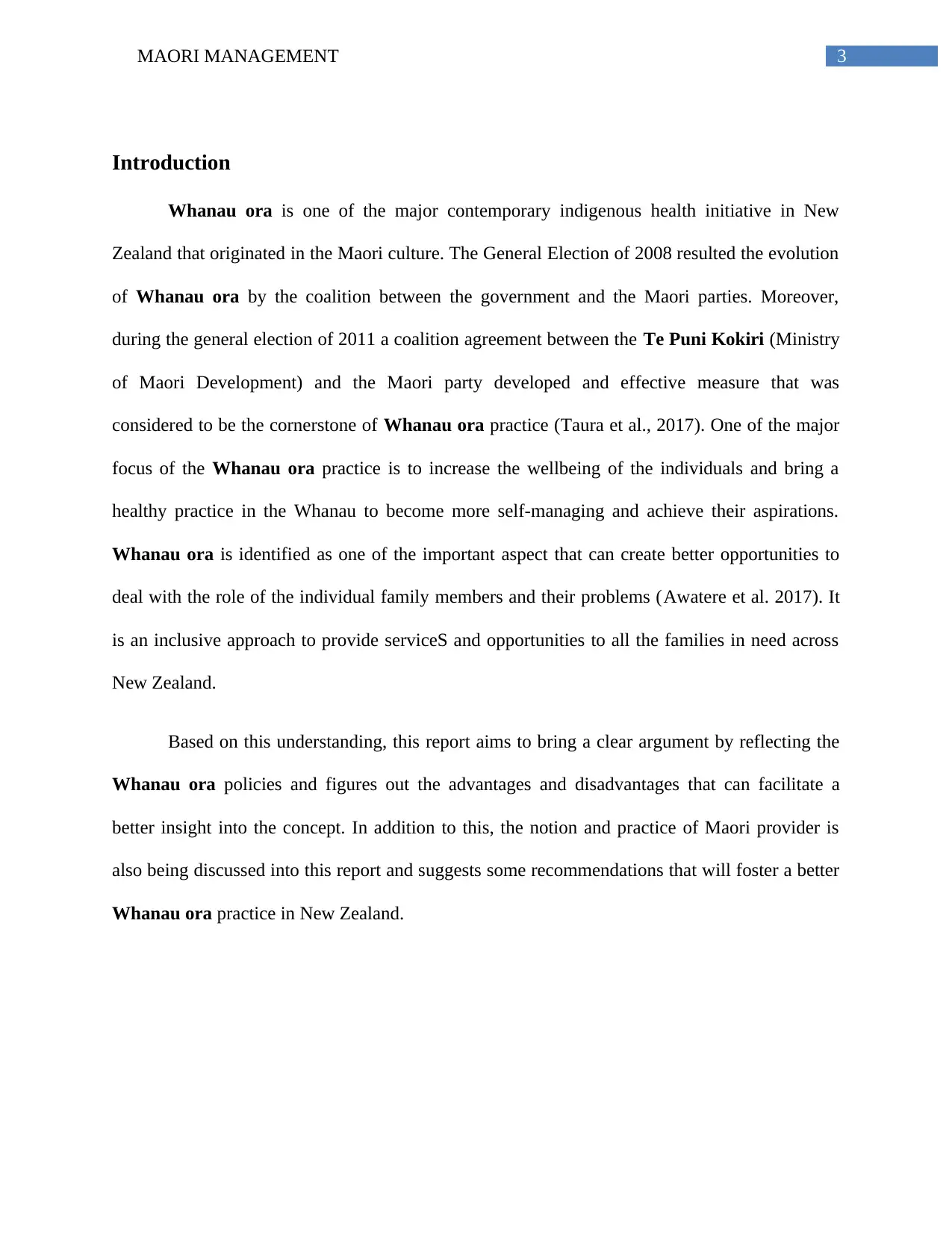
3MAORI MANAGEMENT
Introduction
Whanau ora is one of the major contemporary indigenous health initiative in New
Zealand that originated in the Maori culture. The General Election of 2008 resulted the evolution
of Whanau ora by the coalition between the government and the Maori parties. Moreover,
during the general election of 2011 a coalition agreement between the Te Puni Kokiri (Ministry
of Maori Development) and the Maori party developed and effective measure that was
considered to be the cornerstone of Whanau ora practice (Taura et al., 2017). One of the major
focus of the Whanau ora practice is to increase the wellbeing of the individuals and bring a
healthy practice in the Whanau to become more self-managing and achieve their aspirations.
Whanau ora is identified as one of the important aspect that can create better opportunities to
deal with the role of the individual family members and their problems (Awatere et al. 2017). It
is an inclusive approach to provide serviceS and opportunities to all the families in need across
New Zealand.
Based on this understanding, this report aims to bring a clear argument by reflecting the
Whanau ora policies and figures out the advantages and disadvantages that can facilitate a
better insight into the concept. In addition to this, the notion and practice of Maori provider is
also being discussed into this report and suggests some recommendations that will foster a better
Whanau ora practice in New Zealand.
Introduction
Whanau ora is one of the major contemporary indigenous health initiative in New
Zealand that originated in the Maori culture. The General Election of 2008 resulted the evolution
of Whanau ora by the coalition between the government and the Maori parties. Moreover,
during the general election of 2011 a coalition agreement between the Te Puni Kokiri (Ministry
of Maori Development) and the Maori party developed and effective measure that was
considered to be the cornerstone of Whanau ora practice (Taura et al., 2017). One of the major
focus of the Whanau ora practice is to increase the wellbeing of the individuals and bring a
healthy practice in the Whanau to become more self-managing and achieve their aspirations.
Whanau ora is identified as one of the important aspect that can create better opportunities to
deal with the role of the individual family members and their problems (Awatere et al. 2017). It
is an inclusive approach to provide serviceS and opportunities to all the families in need across
New Zealand.
Based on this understanding, this report aims to bring a clear argument by reflecting the
Whanau ora policies and figures out the advantages and disadvantages that can facilitate a
better insight into the concept. In addition to this, the notion and practice of Maori provider is
also being discussed into this report and suggests some recommendations that will foster a better
Whanau ora practice in New Zealand.
Paraphrase This Document
Need a fresh take? Get an instant paraphrase of this document with our AI Paraphraser
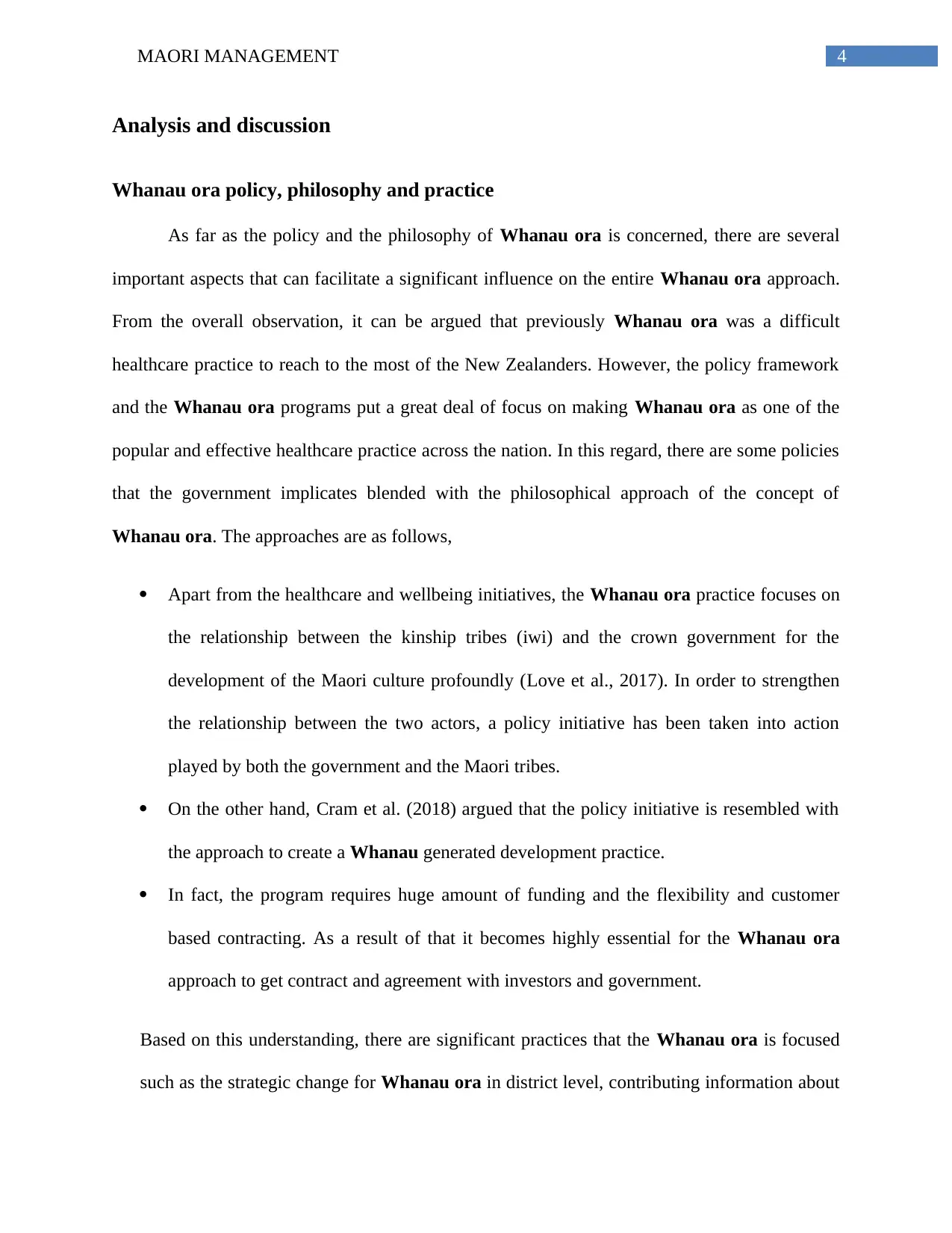
4MAORI MANAGEMENT
Analysis and discussion
Whanau ora policy, philosophy and practice
As far as the policy and the philosophy of Whanau ora is concerned, there are several
important aspects that can facilitate a significant influence on the entire Whanau ora approach.
From the overall observation, it can be argued that previously Whanau ora was a difficult
healthcare practice to reach to the most of the New Zealanders. However, the policy framework
and the Whanau ora programs put a great deal of focus on making Whanau ora as one of the
popular and effective healthcare practice across the nation. In this regard, there are some policies
that the government implicates blended with the philosophical approach of the concept of
Whanau ora. The approaches are as follows,
Apart from the healthcare and wellbeing initiatives, the Whanau ora practice focuses on
the relationship between the kinship tribes (iwi) and the crown government for the
development of the Maori culture profoundly (Love et al., 2017). In order to strengthen
the relationship between the two actors, a policy initiative has been taken into action
played by both the government and the Maori tribes.
On the other hand, Cram et al. (2018) argued that the policy initiative is resembled with
the approach to create a Whanau generated development practice.
In fact, the program requires huge amount of funding and the flexibility and customer
based contracting. As a result of that it becomes highly essential for the Whanau ora
approach to get contract and agreement with investors and government.
Based on this understanding, there are significant practices that the Whanau ora is focused
such as the strategic change for Whanau ora in district level, contributing information about
Analysis and discussion
Whanau ora policy, philosophy and practice
As far as the policy and the philosophy of Whanau ora is concerned, there are several
important aspects that can facilitate a significant influence on the entire Whanau ora approach.
From the overall observation, it can be argued that previously Whanau ora was a difficult
healthcare practice to reach to the most of the New Zealanders. However, the policy framework
and the Whanau ora programs put a great deal of focus on making Whanau ora as one of the
popular and effective healthcare practice across the nation. In this regard, there are some policies
that the government implicates blended with the philosophical approach of the concept of
Whanau ora. The approaches are as follows,
Apart from the healthcare and wellbeing initiatives, the Whanau ora practice focuses on
the relationship between the kinship tribes (iwi) and the crown government for the
development of the Maori culture profoundly (Love et al., 2017). In order to strengthen
the relationship between the two actors, a policy initiative has been taken into action
played by both the government and the Maori tribes.
On the other hand, Cram et al. (2018) argued that the policy initiative is resembled with
the approach to create a Whanau generated development practice.
In fact, the program requires huge amount of funding and the flexibility and customer
based contracting. As a result of that it becomes highly essential for the Whanau ora
approach to get contract and agreement with investors and government.
Based on this understanding, there are significant practices that the Whanau ora is focused
such as the strategic change for Whanau ora in district level, contributing information about
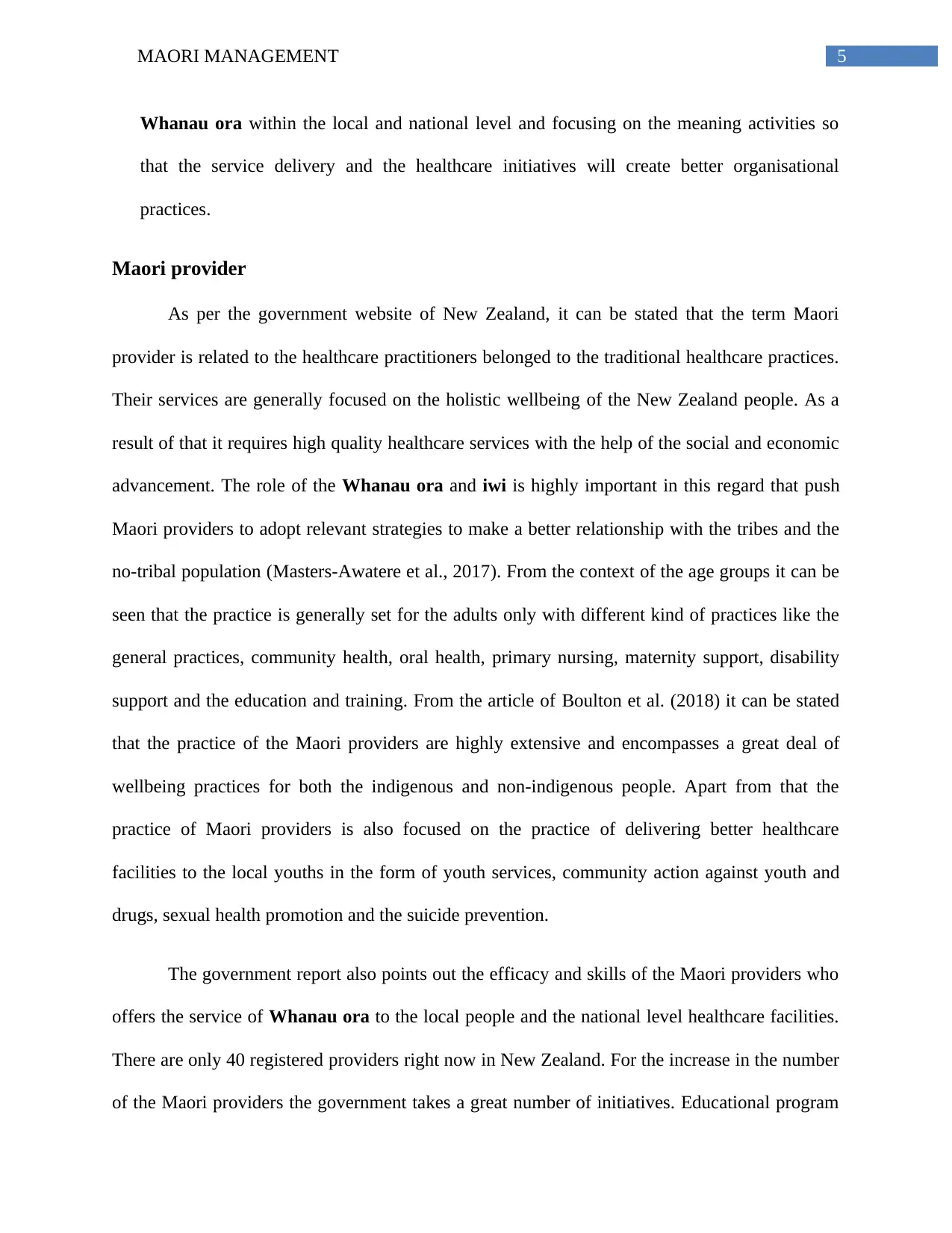
5MAORI MANAGEMENT
Whanau ora within the local and national level and focusing on the meaning activities so
that the service delivery and the healthcare initiatives will create better organisational
practices.
Maori provider
As per the government website of New Zealand, it can be stated that the term Maori
provider is related to the healthcare practitioners belonged to the traditional healthcare practices.
Their services are generally focused on the holistic wellbeing of the New Zealand people. As a
result of that it requires high quality healthcare services with the help of the social and economic
advancement. The role of the Whanau ora and iwi is highly important in this regard that push
Maori providers to adopt relevant strategies to make a better relationship with the tribes and the
no-tribal population (Masters-Awatere et al., 2017). From the context of the age groups it can be
seen that the practice is generally set for the adults only with different kind of practices like the
general practices, community health, oral health, primary nursing, maternity support, disability
support and the education and training. From the article of Boulton et al. (2018) it can be stated
that the practice of the Maori providers are highly extensive and encompasses a great deal of
wellbeing practices for both the indigenous and non-indigenous people. Apart from that the
practice of Maori providers is also focused on the practice of delivering better healthcare
facilities to the local youths in the form of youth services, community action against youth and
drugs, sexual health promotion and the suicide prevention.
The government report also points out the efficacy and skills of the Maori providers who
offers the service of Whanau ora to the local people and the national level healthcare facilities.
There are only 40 registered providers right now in New Zealand. For the increase in the number
of the Maori providers the government takes a great number of initiatives. Educational program
Whanau ora within the local and national level and focusing on the meaning activities so
that the service delivery and the healthcare initiatives will create better organisational
practices.
Maori provider
As per the government website of New Zealand, it can be stated that the term Maori
provider is related to the healthcare practitioners belonged to the traditional healthcare practices.
Their services are generally focused on the holistic wellbeing of the New Zealand people. As a
result of that it requires high quality healthcare services with the help of the social and economic
advancement. The role of the Whanau ora and iwi is highly important in this regard that push
Maori providers to adopt relevant strategies to make a better relationship with the tribes and the
no-tribal population (Masters-Awatere et al., 2017). From the context of the age groups it can be
seen that the practice is generally set for the adults only with different kind of practices like the
general practices, community health, oral health, primary nursing, maternity support, disability
support and the education and training. From the article of Boulton et al. (2018) it can be stated
that the practice of the Maori providers are highly extensive and encompasses a great deal of
wellbeing practices for both the indigenous and non-indigenous people. Apart from that the
practice of Maori providers is also focused on the practice of delivering better healthcare
facilities to the local youths in the form of youth services, community action against youth and
drugs, sexual health promotion and the suicide prevention.
The government report also points out the efficacy and skills of the Maori providers who
offers the service of Whanau ora to the local people and the national level healthcare facilities.
There are only 40 registered providers right now in New Zealand. For the increase in the number
of the Maori providers the government takes a great number of initiatives. Educational program
⊘ This is a preview!⊘
Do you want full access?
Subscribe today to unlock all pages.

Trusted by 1+ million students worldwide
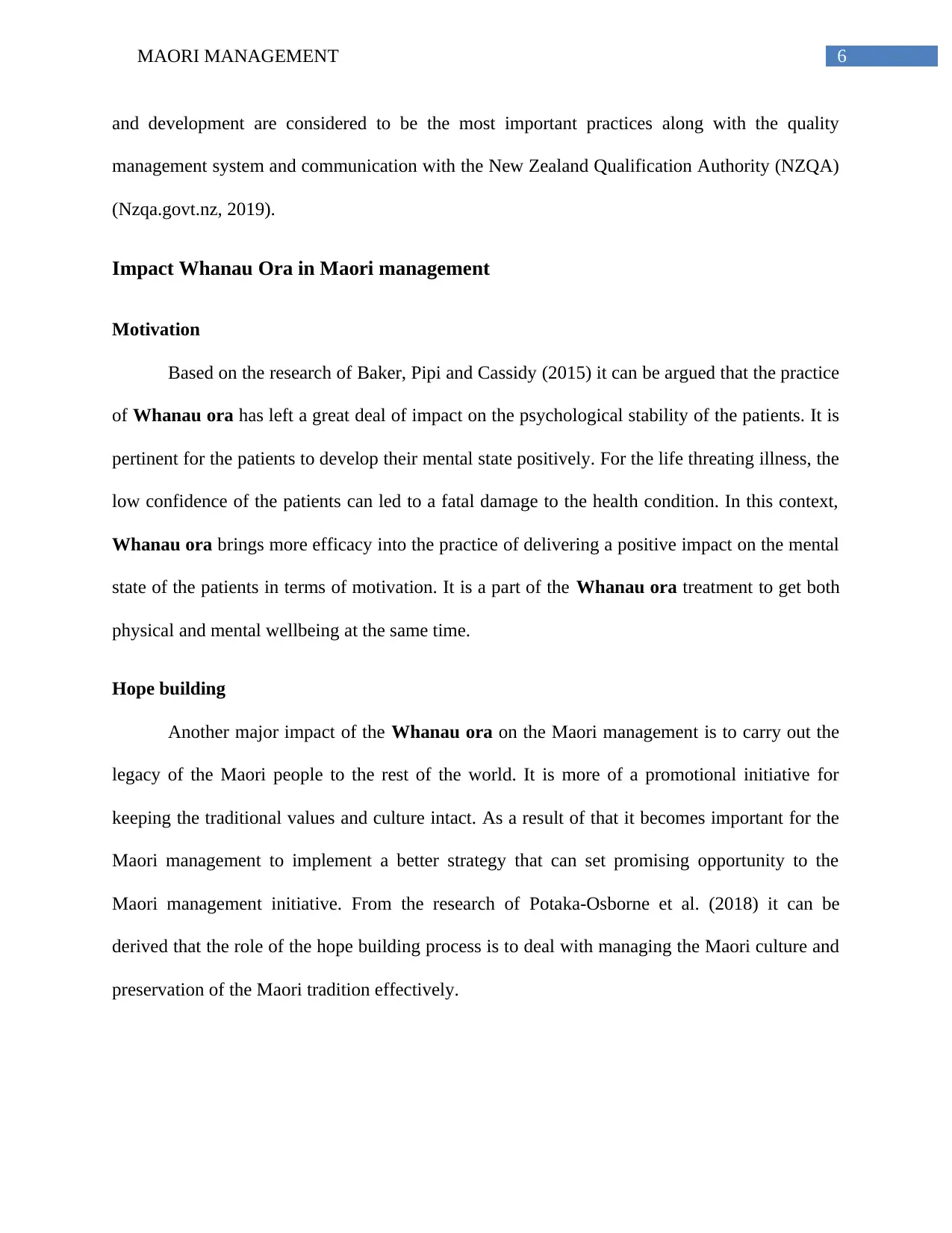
6MAORI MANAGEMENT
and development are considered to be the most important practices along with the quality
management system and communication with the New Zealand Qualification Authority (NZQA)
(Nzqa.govt.nz, 2019).
Impact Whanau Ora in Maori management
Motivation
Based on the research of Baker, Pipi and Cassidy (2015) it can be argued that the practice
of Whanau ora has left a great deal of impact on the psychological stability of the patients. It is
pertinent for the patients to develop their mental state positively. For the life threating illness, the
low confidence of the patients can led to a fatal damage to the health condition. In this context,
Whanau ora brings more efficacy into the practice of delivering a positive impact on the mental
state of the patients in terms of motivation. It is a part of the Whanau ora treatment to get both
physical and mental wellbeing at the same time.
Hope building
Another major impact of the Whanau ora on the Maori management is to carry out the
legacy of the Maori people to the rest of the world. It is more of a promotional initiative for
keeping the traditional values and culture intact. As a result of that it becomes important for the
Maori management to implement a better strategy that can set promising opportunity to the
Maori management initiative. From the research of Potaka-Osborne et al. (2018) it can be
derived that the role of the hope building process is to deal with managing the Maori culture and
preservation of the Maori tradition effectively.
and development are considered to be the most important practices along with the quality
management system and communication with the New Zealand Qualification Authority (NZQA)
(Nzqa.govt.nz, 2019).
Impact Whanau Ora in Maori management
Motivation
Based on the research of Baker, Pipi and Cassidy (2015) it can be argued that the practice
of Whanau ora has left a great deal of impact on the psychological stability of the patients. It is
pertinent for the patients to develop their mental state positively. For the life threating illness, the
low confidence of the patients can led to a fatal damage to the health condition. In this context,
Whanau ora brings more efficacy into the practice of delivering a positive impact on the mental
state of the patients in terms of motivation. It is a part of the Whanau ora treatment to get both
physical and mental wellbeing at the same time.
Hope building
Another major impact of the Whanau ora on the Maori management is to carry out the
legacy of the Maori people to the rest of the world. It is more of a promotional initiative for
keeping the traditional values and culture intact. As a result of that it becomes important for the
Maori management to implement a better strategy that can set promising opportunity to the
Maori management initiative. From the research of Potaka-Osborne et al. (2018) it can be
derived that the role of the hope building process is to deal with managing the Maori culture and
preservation of the Maori tradition effectively.
Paraphrase This Document
Need a fresh take? Get an instant paraphrase of this document with our AI Paraphraser
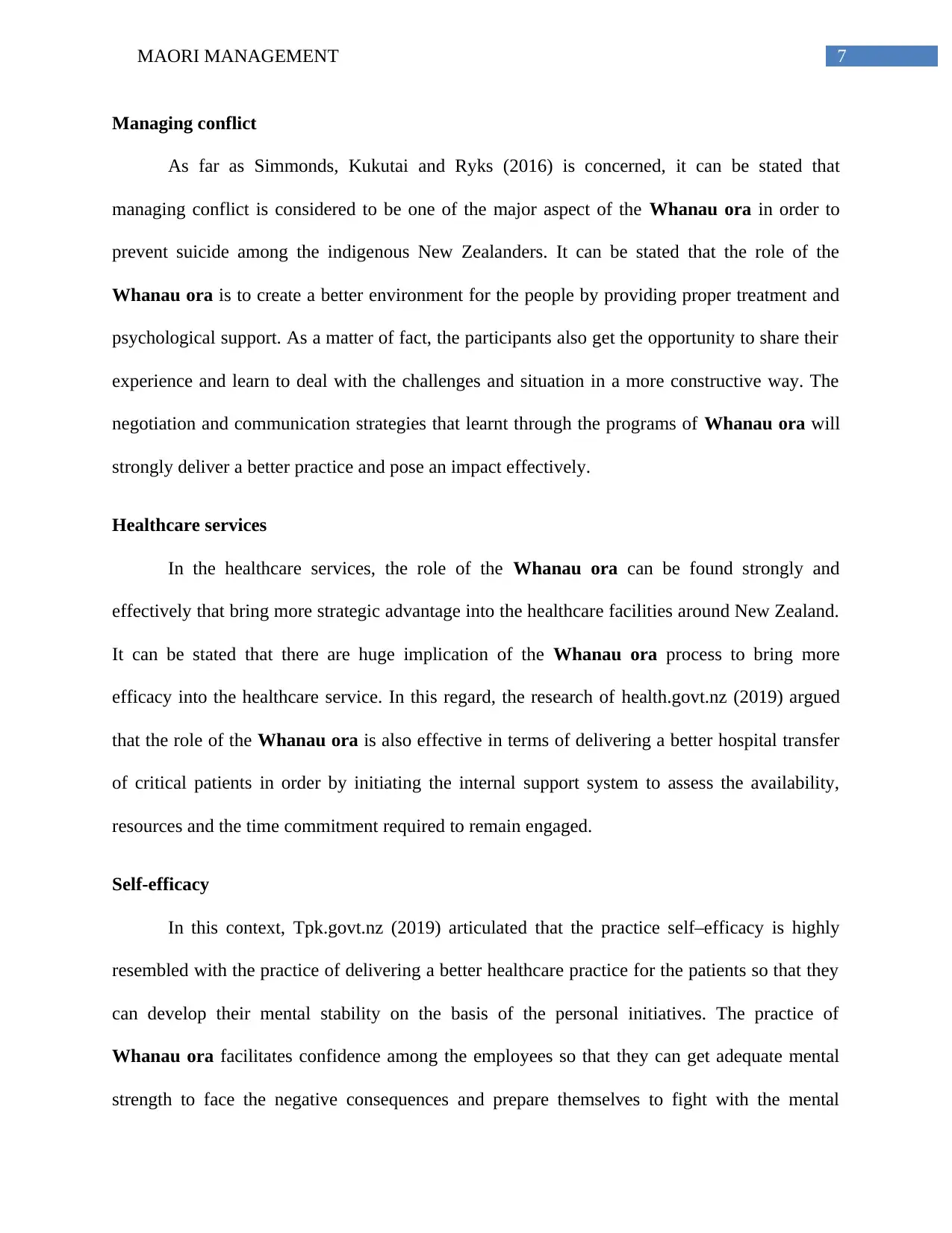
7MAORI MANAGEMENT
Managing conflict
As far as Simmonds, Kukutai and Ryks (2016) is concerned, it can be stated that
managing conflict is considered to be one of the major aspect of the Whanau ora in order to
prevent suicide among the indigenous New Zealanders. It can be stated that the role of the
Whanau ora is to create a better environment for the people by providing proper treatment and
psychological support. As a matter of fact, the participants also get the opportunity to share their
experience and learn to deal with the challenges and situation in a more constructive way. The
negotiation and communication strategies that learnt through the programs of Whanau ora will
strongly deliver a better practice and pose an impact effectively.
Healthcare services
In the healthcare services, the role of the Whanau ora can be found strongly and
effectively that bring more strategic advantage into the healthcare facilities around New Zealand.
It can be stated that there are huge implication of the Whanau ora process to bring more
efficacy into the healthcare service. In this regard, the research of health.govt.nz (2019) argued
that the role of the Whanau ora is also effective in terms of delivering a better hospital transfer
of critical patients in order by initiating the internal support system to assess the availability,
resources and the time commitment required to remain engaged.
Self-efficacy
In this context, Tpk.govt.nz (2019) articulated that the practice self–efficacy is highly
resembled with the practice of delivering a better healthcare practice for the patients so that they
can develop their mental stability on the basis of the personal initiatives. The practice of
Whanau ora facilitates confidence among the employees so that they can get adequate mental
strength to face the negative consequences and prepare themselves to fight with the mental
Managing conflict
As far as Simmonds, Kukutai and Ryks (2016) is concerned, it can be stated that
managing conflict is considered to be one of the major aspect of the Whanau ora in order to
prevent suicide among the indigenous New Zealanders. It can be stated that the role of the
Whanau ora is to create a better environment for the people by providing proper treatment and
psychological support. As a matter of fact, the participants also get the opportunity to share their
experience and learn to deal with the challenges and situation in a more constructive way. The
negotiation and communication strategies that learnt through the programs of Whanau ora will
strongly deliver a better practice and pose an impact effectively.
Healthcare services
In the healthcare services, the role of the Whanau ora can be found strongly and
effectively that bring more strategic advantage into the healthcare facilities around New Zealand.
It can be stated that there are huge implication of the Whanau ora process to bring more
efficacy into the healthcare service. In this regard, the research of health.govt.nz (2019) argued
that the role of the Whanau ora is also effective in terms of delivering a better hospital transfer
of critical patients in order by initiating the internal support system to assess the availability,
resources and the time commitment required to remain engaged.
Self-efficacy
In this context, Tpk.govt.nz (2019) articulated that the practice self–efficacy is highly
resembled with the practice of delivering a better healthcare practice for the patients so that they
can develop their mental stability on the basis of the personal initiatives. The practice of
Whanau ora facilitates confidence among the employees so that they can get adequate mental
strength to face the negative consequences and prepare themselves to fight with the mental
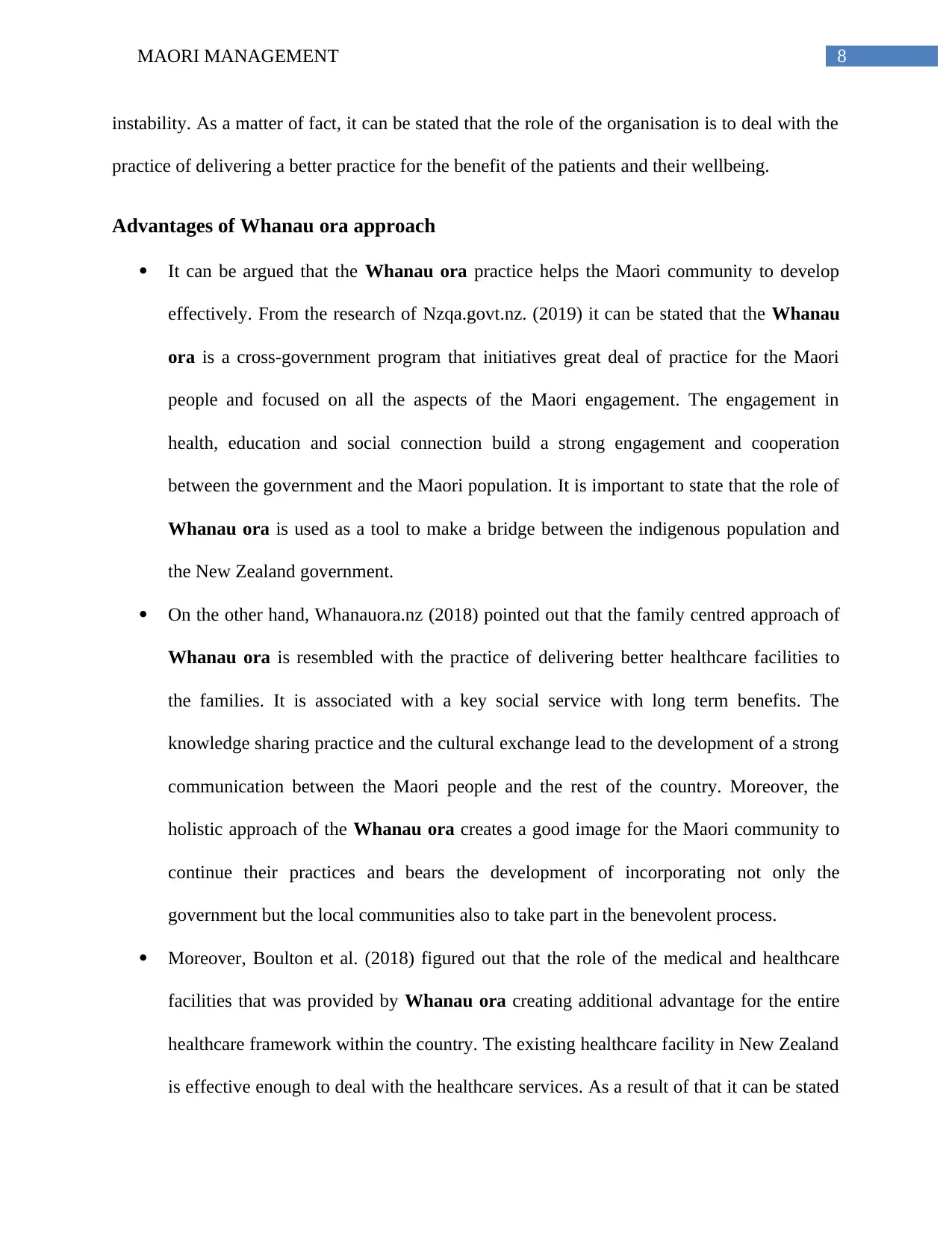
8MAORI MANAGEMENT
instability. As a matter of fact, it can be stated that the role of the organisation is to deal with the
practice of delivering a better practice for the benefit of the patients and their wellbeing.
Advantages of Whanau ora approach
It can be argued that the Whanau ora practice helps the Maori community to develop
effectively. From the research of Nzqa.govt.nz. (2019) it can be stated that the Whanau
ora is a cross-government program that initiatives great deal of practice for the Maori
people and focused on all the aspects of the Maori engagement. The engagement in
health, education and social connection build a strong engagement and cooperation
between the government and the Maori population. It is important to state that the role of
Whanau ora is used as a tool to make a bridge between the indigenous population and
the New Zealand government.
On the other hand, Whanauora.nz (2018) pointed out that the family centred approach of
Whanau ora is resembled with the practice of delivering better healthcare facilities to
the families. It is associated with a key social service with long term benefits. The
knowledge sharing practice and the cultural exchange lead to the development of a strong
communication between the Maori people and the rest of the country. Moreover, the
holistic approach of the Whanau ora creates a good image for the Maori community to
continue their practices and bears the development of incorporating not only the
government but the local communities also to take part in the benevolent process.
Moreover, Boulton et al. (2018) figured out that the role of the medical and healthcare
facilities that was provided by Whanau ora creating additional advantage for the entire
healthcare framework within the country. The existing healthcare facility in New Zealand
is effective enough to deal with the healthcare services. As a result of that it can be stated
instability. As a matter of fact, it can be stated that the role of the organisation is to deal with the
practice of delivering a better practice for the benefit of the patients and their wellbeing.
Advantages of Whanau ora approach
It can be argued that the Whanau ora practice helps the Maori community to develop
effectively. From the research of Nzqa.govt.nz. (2019) it can be stated that the Whanau
ora is a cross-government program that initiatives great deal of practice for the Maori
people and focused on all the aspects of the Maori engagement. The engagement in
health, education and social connection build a strong engagement and cooperation
between the government and the Maori population. It is important to state that the role of
Whanau ora is used as a tool to make a bridge between the indigenous population and
the New Zealand government.
On the other hand, Whanauora.nz (2018) pointed out that the family centred approach of
Whanau ora is resembled with the practice of delivering better healthcare facilities to
the families. It is associated with a key social service with long term benefits. The
knowledge sharing practice and the cultural exchange lead to the development of a strong
communication between the Maori people and the rest of the country. Moreover, the
holistic approach of the Whanau ora creates a good image for the Maori community to
continue their practices and bears the development of incorporating not only the
government but the local communities also to take part in the benevolent process.
Moreover, Boulton et al. (2018) figured out that the role of the medical and healthcare
facilities that was provided by Whanau ora creating additional advantage for the entire
healthcare framework within the country. The existing healthcare facility in New Zealand
is effective enough to deal with the healthcare services. As a result of that it can be stated
⊘ This is a preview!⊘
Do you want full access?
Subscribe today to unlock all pages.

Trusted by 1+ million students worldwide
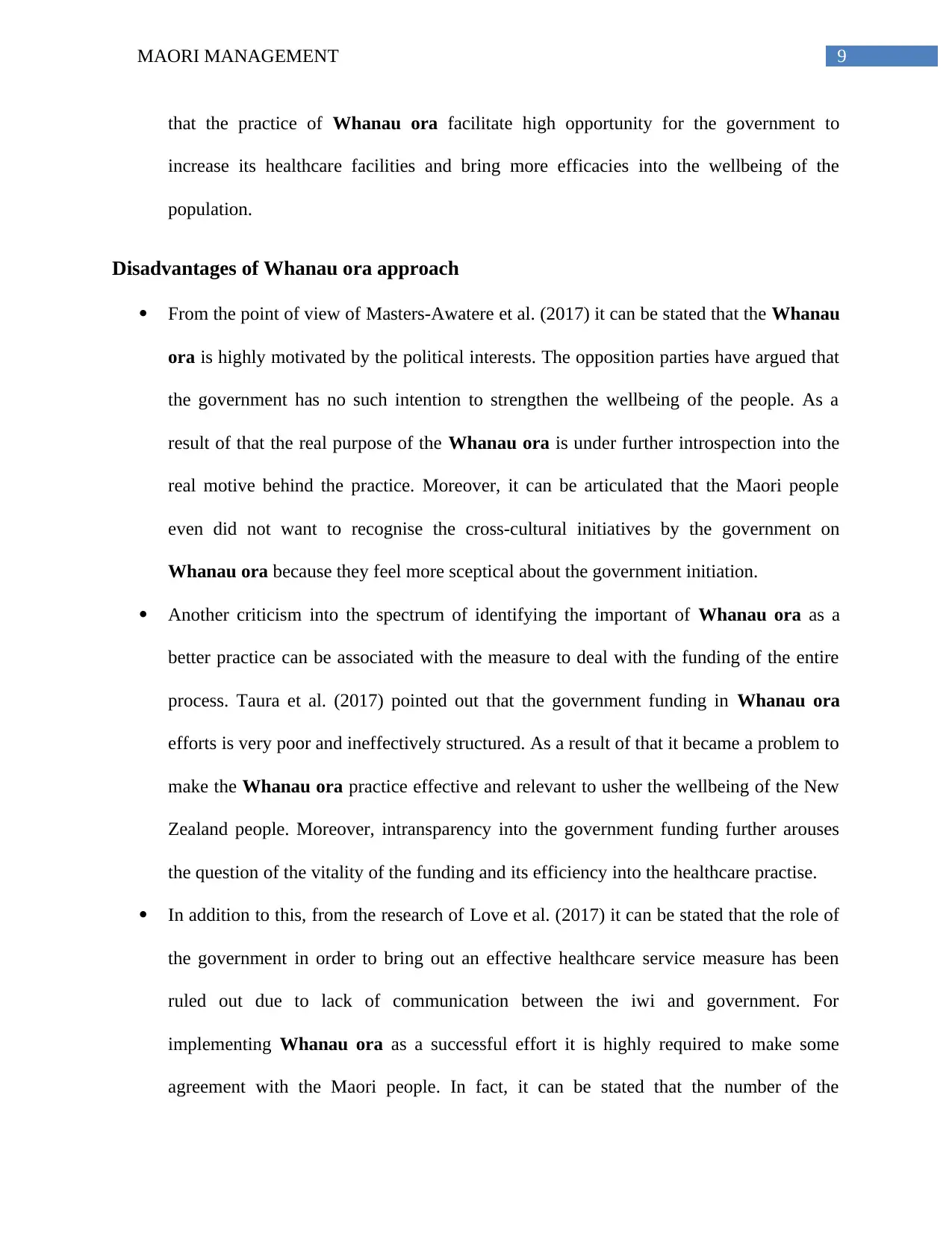
9MAORI MANAGEMENT
that the practice of Whanau ora facilitate high opportunity for the government to
increase its healthcare facilities and bring more efficacies into the wellbeing of the
population.
Disadvantages of Whanau ora approach
From the point of view of Masters-Awatere et al. (2017) it can be stated that the Whanau
ora is highly motivated by the political interests. The opposition parties have argued that
the government has no such intention to strengthen the wellbeing of the people. As a
result of that the real purpose of the Whanau ora is under further introspection into the
real motive behind the practice. Moreover, it can be articulated that the Maori people
even did not want to recognise the cross-cultural initiatives by the government on
Whanau ora because they feel more sceptical about the government initiation.
Another criticism into the spectrum of identifying the important of Whanau ora as a
better practice can be associated with the measure to deal with the funding of the entire
process. Taura et al. (2017) pointed out that the government funding in Whanau ora
efforts is very poor and ineffectively structured. As a result of that it became a problem to
make the Whanau ora practice effective and relevant to usher the wellbeing of the New
Zealand people. Moreover, intransparency into the government funding further arouses
the question of the vitality of the funding and its efficiency into the healthcare practise.
In addition to this, from the research of Love et al. (2017) it can be stated that the role of
the government in order to bring out an effective healthcare service measure has been
ruled out due to lack of communication between the iwi and government. For
implementing Whanau ora as a successful effort it is highly required to make some
agreement with the Maori people. In fact, it can be stated that the number of the
that the practice of Whanau ora facilitate high opportunity for the government to
increase its healthcare facilities and bring more efficacies into the wellbeing of the
population.
Disadvantages of Whanau ora approach
From the point of view of Masters-Awatere et al. (2017) it can be stated that the Whanau
ora is highly motivated by the political interests. The opposition parties have argued that
the government has no such intention to strengthen the wellbeing of the people. As a
result of that the real purpose of the Whanau ora is under further introspection into the
real motive behind the practice. Moreover, it can be articulated that the Maori people
even did not want to recognise the cross-cultural initiatives by the government on
Whanau ora because they feel more sceptical about the government initiation.
Another criticism into the spectrum of identifying the important of Whanau ora as a
better practice can be associated with the measure to deal with the funding of the entire
process. Taura et al. (2017) pointed out that the government funding in Whanau ora
efforts is very poor and ineffectively structured. As a result of that it became a problem to
make the Whanau ora practice effective and relevant to usher the wellbeing of the New
Zealand people. Moreover, intransparency into the government funding further arouses
the question of the vitality of the funding and its efficiency into the healthcare practise.
In addition to this, from the research of Love et al. (2017) it can be stated that the role of
the government in order to bring out an effective healthcare service measure has been
ruled out due to lack of communication between the iwi and government. For
implementing Whanau ora as a successful effort it is highly required to make some
agreement with the Maori people. In fact, it can be stated that the number of the
Paraphrase This Document
Need a fresh take? Get an instant paraphrase of this document with our AI Paraphraser
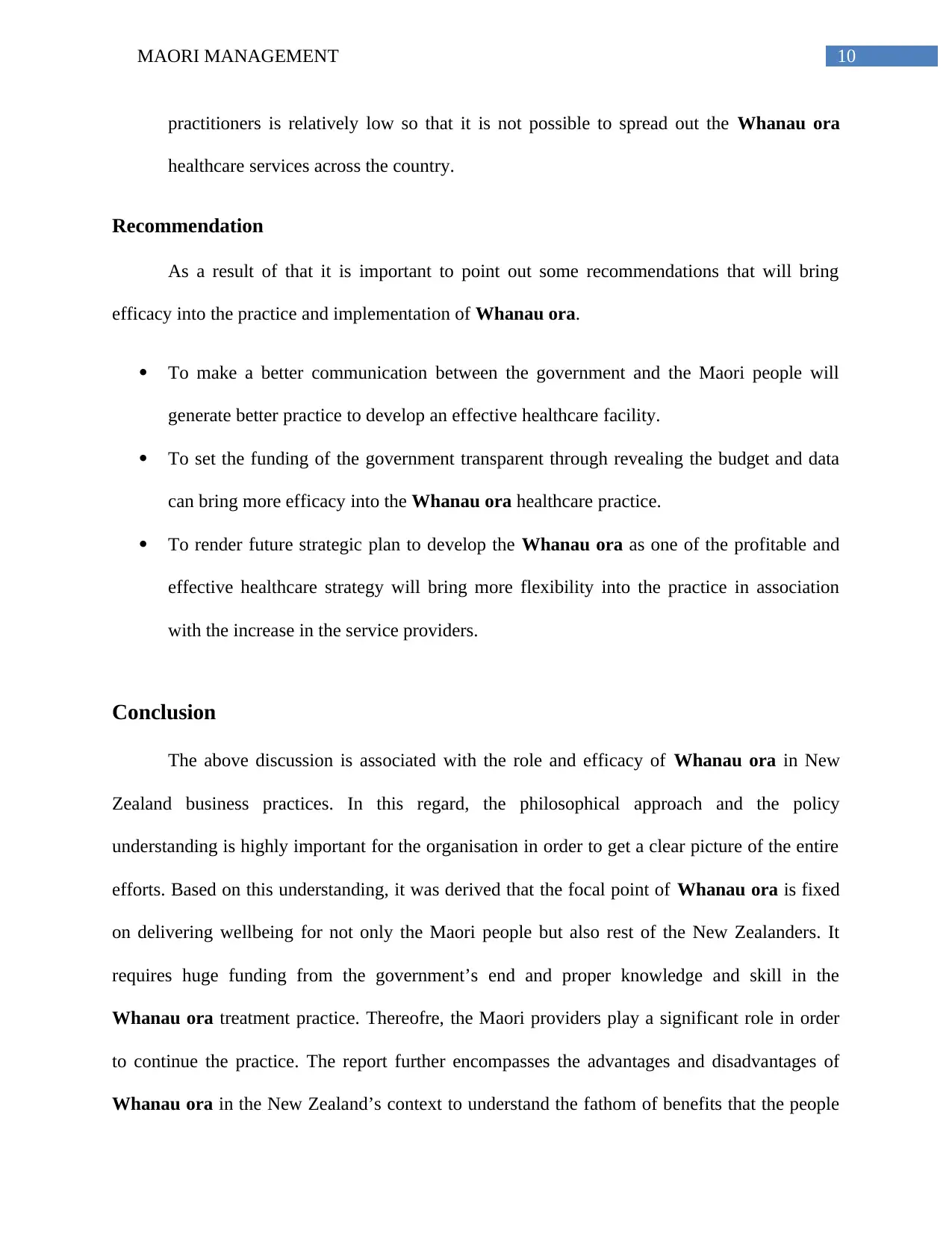
10MAORI MANAGEMENT
practitioners is relatively low so that it is not possible to spread out the Whanau ora
healthcare services across the country.
Recommendation
As a result of that it is important to point out some recommendations that will bring
efficacy into the practice and implementation of Whanau ora.
To make a better communication between the government and the Maori people will
generate better practice to develop an effective healthcare facility.
To set the funding of the government transparent through revealing the budget and data
can bring more efficacy into the Whanau ora healthcare practice.
To render future strategic plan to develop the Whanau ora as one of the profitable and
effective healthcare strategy will bring more flexibility into the practice in association
with the increase in the service providers.
Conclusion
The above discussion is associated with the role and efficacy of Whanau ora in New
Zealand business practices. In this regard, the philosophical approach and the policy
understanding is highly important for the organisation in order to get a clear picture of the entire
efforts. Based on this understanding, it was derived that the focal point of Whanau ora is fixed
on delivering wellbeing for not only the Maori people but also rest of the New Zealanders. It
requires huge funding from the government’s end and proper knowledge and skill in the
Whanau ora treatment practice. Thereofre, the Maori providers play a significant role in order
to continue the practice. The report further encompasses the advantages and disadvantages of
Whanau ora in the New Zealand’s context to understand the fathom of benefits that the people
practitioners is relatively low so that it is not possible to spread out the Whanau ora
healthcare services across the country.
Recommendation
As a result of that it is important to point out some recommendations that will bring
efficacy into the practice and implementation of Whanau ora.
To make a better communication between the government and the Maori people will
generate better practice to develop an effective healthcare facility.
To set the funding of the government transparent through revealing the budget and data
can bring more efficacy into the Whanau ora healthcare practice.
To render future strategic plan to develop the Whanau ora as one of the profitable and
effective healthcare strategy will bring more flexibility into the practice in association
with the increase in the service providers.
Conclusion
The above discussion is associated with the role and efficacy of Whanau ora in New
Zealand business practices. In this regard, the philosophical approach and the policy
understanding is highly important for the organisation in order to get a clear picture of the entire
efforts. Based on this understanding, it was derived that the focal point of Whanau ora is fixed
on delivering wellbeing for not only the Maori people but also rest of the New Zealanders. It
requires huge funding from the government’s end and proper knowledge and skill in the
Whanau ora treatment practice. Thereofre, the Maori providers play a significant role in order
to continue the practice. The report further encompasses the advantages and disadvantages of
Whanau ora in the New Zealand’s context to understand the fathom of benefits that the people
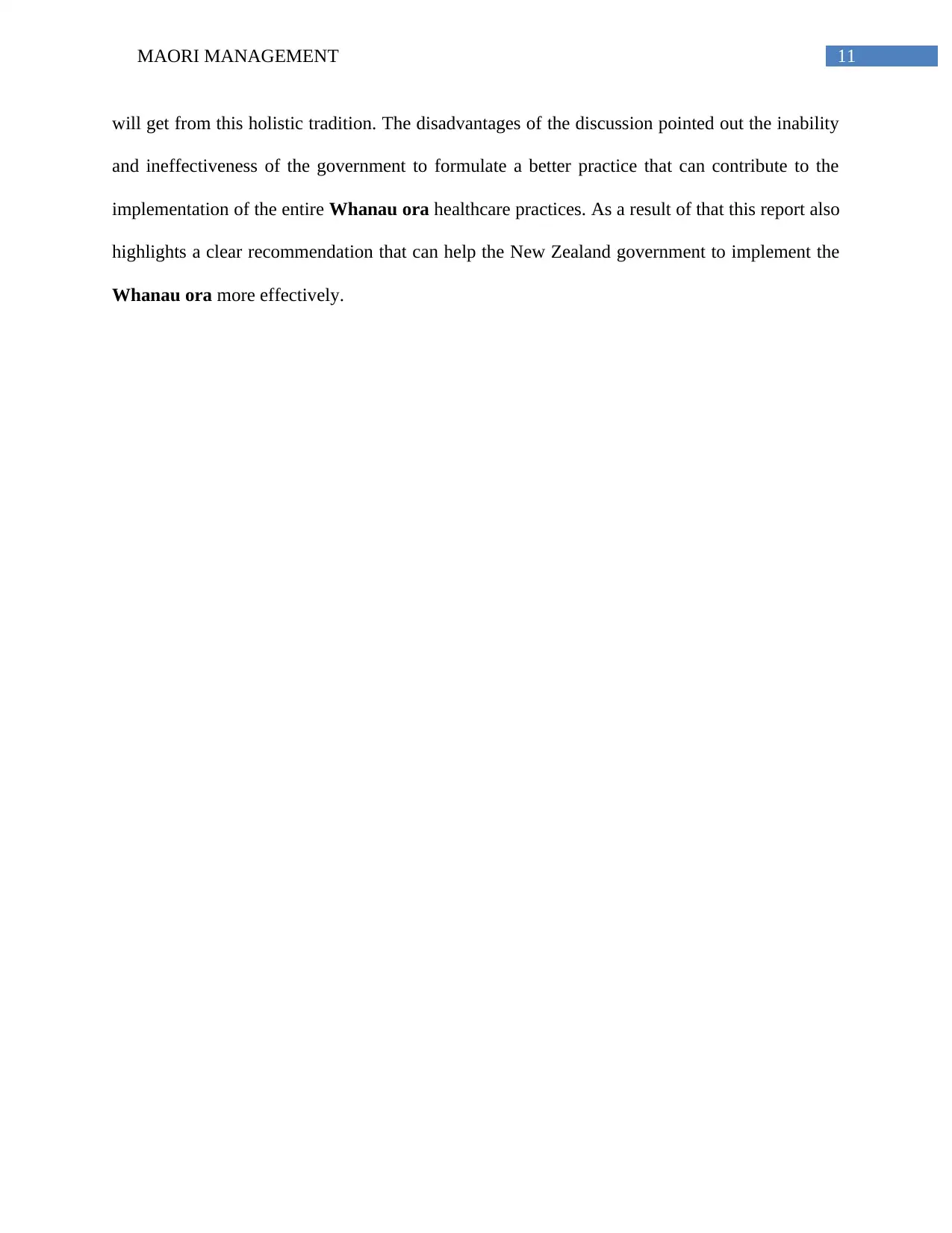
11MAORI MANAGEMENT
will get from this holistic tradition. The disadvantages of the discussion pointed out the inability
and ineffectiveness of the government to formulate a better practice that can contribute to the
implementation of the entire Whanau ora healthcare practices. As a result of that this report also
highlights a clear recommendation that can help the New Zealand government to implement the
Whanau ora more effectively.
will get from this holistic tradition. The disadvantages of the discussion pointed out the inability
and ineffectiveness of the government to formulate a better practice that can contribute to the
implementation of the entire Whanau ora healthcare practices. As a result of that this report also
highlights a clear recommendation that can help the New Zealand government to implement the
Whanau ora more effectively.
⊘ This is a preview!⊘
Do you want full access?
Subscribe today to unlock all pages.

Trusted by 1+ million students worldwide
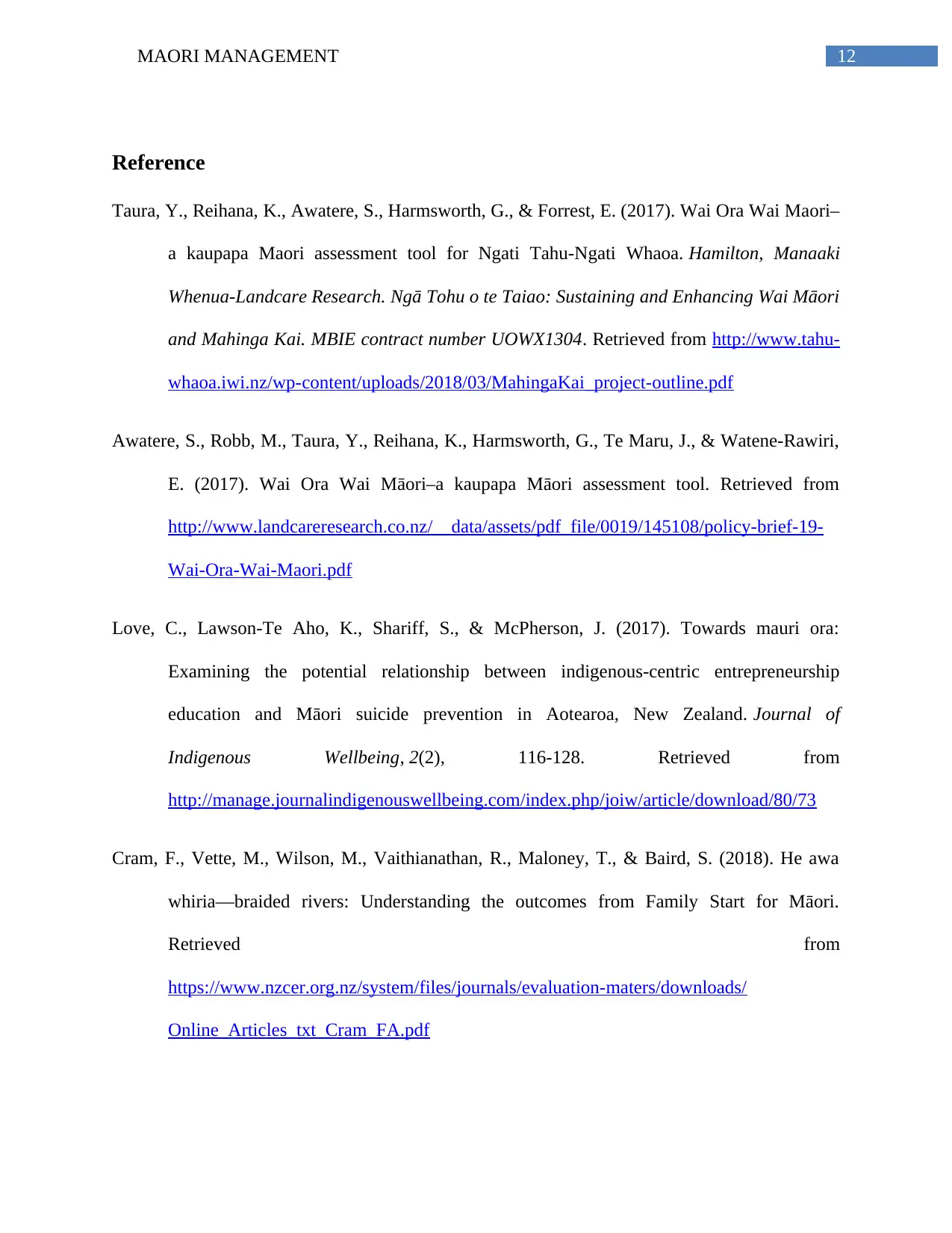
12MAORI MANAGEMENT
Reference
Taura, Y., Reihana, K., Awatere, S., Harmsworth, G., & Forrest, E. (2017). Wai Ora Wai Maori–
a kaupapa Maori assessment tool for Ngati Tahu-Ngati Whaoa. Hamilton, Manaaki
Whenua-Landcare Research. Ngā Tohu o te Taiao: Sustaining and Enhancing Wai Māori
and Mahinga Kai. MBIE contract number UOWX1304. Retrieved from http://www.tahu-
whaoa.iwi.nz/wp-content/uploads/2018/03/MahingaKai_project-outline.pdf
Awatere, S., Robb, M., Taura, Y., Reihana, K., Harmsworth, G., Te Maru, J., & Watene-Rawiri,
E. (2017). Wai Ora Wai Māori–a kaupapa Māori assessment tool. Retrieved from
http://www.landcareresearch.co.nz/__data/assets/pdf_file/0019/145108/policy-brief-19-
Wai-Ora-Wai-Maori.pdf
Love, C., Lawson-Te Aho, K., Shariff, S., & McPherson, J. (2017). Towards mauri ora:
Examining the potential relationship between indigenous-centric entrepreneurship
education and Māori suicide prevention in Aotearoa, New Zealand. Journal of
Indigenous Wellbeing, 2(2), 116-128. Retrieved from
http://manage.journalindigenouswellbeing.com/index.php/joiw/article/download/80/73
Cram, F., Vette, M., Wilson, M., Vaithianathan, R., Maloney, T., & Baird, S. (2018). He awa
whiria—braided rivers: Understanding the outcomes from Family Start for Māori.
Retrieved from
https://www.nzcer.org.nz/system/files/journals/evaluation-maters/downloads/
Online_Articles_txt_Cram_FA.pdf
Reference
Taura, Y., Reihana, K., Awatere, S., Harmsworth, G., & Forrest, E. (2017). Wai Ora Wai Maori–
a kaupapa Maori assessment tool for Ngati Tahu-Ngati Whaoa. Hamilton, Manaaki
Whenua-Landcare Research. Ngā Tohu o te Taiao: Sustaining and Enhancing Wai Māori
and Mahinga Kai. MBIE contract number UOWX1304. Retrieved from http://www.tahu-
whaoa.iwi.nz/wp-content/uploads/2018/03/MahingaKai_project-outline.pdf
Awatere, S., Robb, M., Taura, Y., Reihana, K., Harmsworth, G., Te Maru, J., & Watene-Rawiri,
E. (2017). Wai Ora Wai Māori–a kaupapa Māori assessment tool. Retrieved from
http://www.landcareresearch.co.nz/__data/assets/pdf_file/0019/145108/policy-brief-19-
Wai-Ora-Wai-Maori.pdf
Love, C., Lawson-Te Aho, K., Shariff, S., & McPherson, J. (2017). Towards mauri ora:
Examining the potential relationship between indigenous-centric entrepreneurship
education and Māori suicide prevention in Aotearoa, New Zealand. Journal of
Indigenous Wellbeing, 2(2), 116-128. Retrieved from
http://manage.journalindigenouswellbeing.com/index.php/joiw/article/download/80/73
Cram, F., Vette, M., Wilson, M., Vaithianathan, R., Maloney, T., & Baird, S. (2018). He awa
whiria—braided rivers: Understanding the outcomes from Family Start for Māori.
Retrieved from
https://www.nzcer.org.nz/system/files/journals/evaluation-maters/downloads/
Online_Articles_txt_Cram_FA.pdf
Paraphrase This Document
Need a fresh take? Get an instant paraphrase of this document with our AI Paraphraser
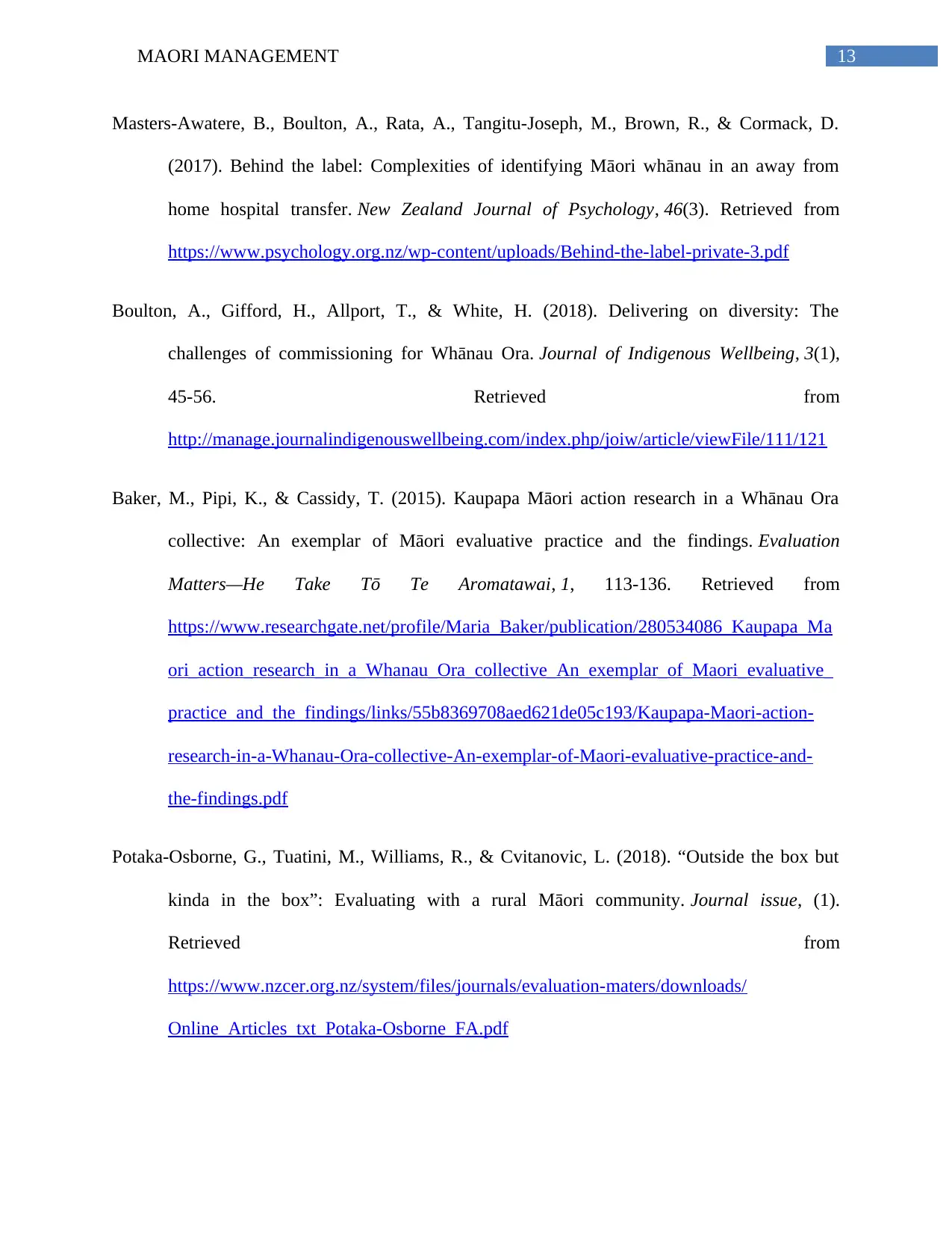
13MAORI MANAGEMENT
Masters-Awatere, B., Boulton, A., Rata, A., Tangitu-Joseph, M., Brown, R., & Cormack, D.
(2017). Behind the label: Complexities of identifying Māori whānau in an away from
home hospital transfer. New Zealand Journal of Psychology, 46(3). Retrieved from
https://www.psychology.org.nz/wp-content/uploads/Behind-the-label-private-3.pdf
Boulton, A., Gifford, H., Allport, T., & White, H. (2018). Delivering on diversity: The
challenges of commissioning for Whānau Ora. Journal of Indigenous Wellbeing, 3(1),
45-56. Retrieved from
http://manage.journalindigenouswellbeing.com/index.php/joiw/article/viewFile/111/121
Baker, M., Pipi, K., & Cassidy, T. (2015). Kaupapa Māori action research in a Whānau Ora
collective: An exemplar of Māori evaluative practice and the findings. Evaluation
Matters—He Take Tō Te Aromatawai, 1, 113-136. Retrieved from
https://www.researchgate.net/profile/Maria_Baker/publication/280534086_Kaupapa_Ma
ori_action_research_in_a_Whanau_Ora_collective_An_exemplar_of_Maori_evaluative_
practice_and_the_findings/links/55b8369708aed621de05c193/Kaupapa-Maori-action-
research-in-a-Whanau-Ora-collective-An-exemplar-of-Maori-evaluative-practice-and-
the-findings.pdf
Potaka-Osborne, G., Tuatini, M., Williams, R., & Cvitanovic, L. (2018). “Outside the box but
kinda in the box”: Evaluating with a rural Māori community. Journal issue, (1).
Retrieved from
https://www.nzcer.org.nz/system/files/journals/evaluation-maters/downloads/
Online_Articles_txt_Potaka-Osborne_FA.pdf
Masters-Awatere, B., Boulton, A., Rata, A., Tangitu-Joseph, M., Brown, R., & Cormack, D.
(2017). Behind the label: Complexities of identifying Māori whānau in an away from
home hospital transfer. New Zealand Journal of Psychology, 46(3). Retrieved from
https://www.psychology.org.nz/wp-content/uploads/Behind-the-label-private-3.pdf
Boulton, A., Gifford, H., Allport, T., & White, H. (2018). Delivering on diversity: The
challenges of commissioning for Whānau Ora. Journal of Indigenous Wellbeing, 3(1),
45-56. Retrieved from
http://manage.journalindigenouswellbeing.com/index.php/joiw/article/viewFile/111/121
Baker, M., Pipi, K., & Cassidy, T. (2015). Kaupapa Māori action research in a Whānau Ora
collective: An exemplar of Māori evaluative practice and the findings. Evaluation
Matters—He Take Tō Te Aromatawai, 1, 113-136. Retrieved from
https://www.researchgate.net/profile/Maria_Baker/publication/280534086_Kaupapa_Ma
ori_action_research_in_a_Whanau_Ora_collective_An_exemplar_of_Maori_evaluative_
practice_and_the_findings/links/55b8369708aed621de05c193/Kaupapa-Maori-action-
research-in-a-Whanau-Ora-collective-An-exemplar-of-Maori-evaluative-practice-and-
the-findings.pdf
Potaka-Osborne, G., Tuatini, M., Williams, R., & Cvitanovic, L. (2018). “Outside the box but
kinda in the box”: Evaluating with a rural Māori community. Journal issue, (1).
Retrieved from
https://www.nzcer.org.nz/system/files/journals/evaluation-maters/downloads/
Online_Articles_txt_Potaka-Osborne_FA.pdf
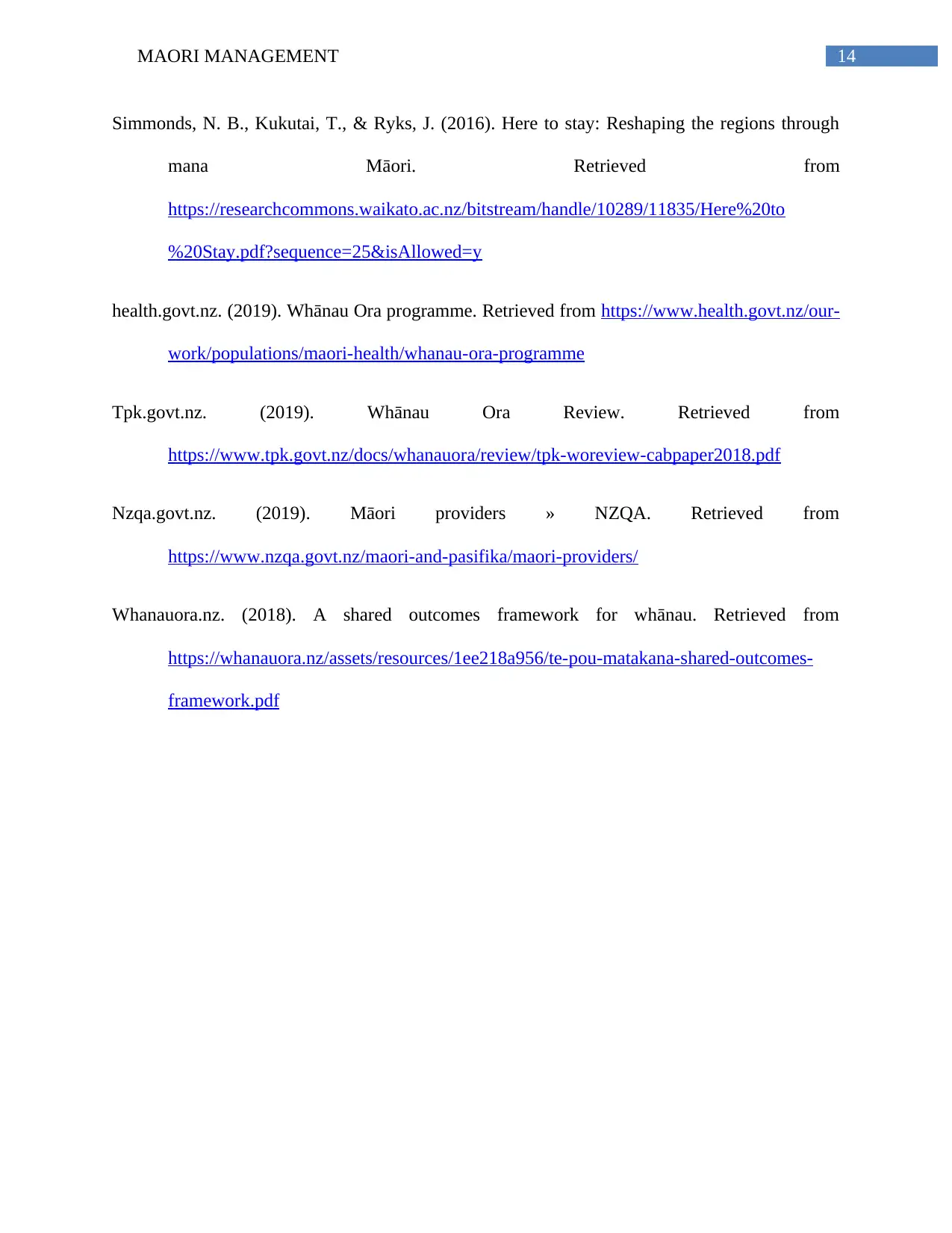
14MAORI MANAGEMENT
Simmonds, N. B., Kukutai, T., & Ryks, J. (2016). Here to stay: Reshaping the regions through
mana Māori. Retrieved from
https://researchcommons.waikato.ac.nz/bitstream/handle/10289/11835/Here%20to
%20Stay.pdf?sequence=25&isAllowed=y
health.govt.nz. (2019). Whānau Ora programme. Retrieved from https://www.health.govt.nz/our-
work/populations/maori-health/whanau-ora-programme
Tpk.govt.nz. (2019). Whānau Ora Review. Retrieved from
https://www.tpk.govt.nz/docs/whanauora/review/tpk-woreview-cabpaper2018.pdf
Nzqa.govt.nz. (2019). Māori providers » NZQA. Retrieved from
https://www.nzqa.govt.nz/maori-and-pasifika/maori-providers/
Whanauora.nz. (2018). A shared outcomes framework for whānau. Retrieved from
https://whanauora.nz/assets/resources/1ee218a956/te-pou-matakana-shared-outcomes-
framework.pdf
Simmonds, N. B., Kukutai, T., & Ryks, J. (2016). Here to stay: Reshaping the regions through
mana Māori. Retrieved from
https://researchcommons.waikato.ac.nz/bitstream/handle/10289/11835/Here%20to
%20Stay.pdf?sequence=25&isAllowed=y
health.govt.nz. (2019). Whānau Ora programme. Retrieved from https://www.health.govt.nz/our-
work/populations/maori-health/whanau-ora-programme
Tpk.govt.nz. (2019). Whānau Ora Review. Retrieved from
https://www.tpk.govt.nz/docs/whanauora/review/tpk-woreview-cabpaper2018.pdf
Nzqa.govt.nz. (2019). Māori providers » NZQA. Retrieved from
https://www.nzqa.govt.nz/maori-and-pasifika/maori-providers/
Whanauora.nz. (2018). A shared outcomes framework for whānau. Retrieved from
https://whanauora.nz/assets/resources/1ee218a956/te-pou-matakana-shared-outcomes-
framework.pdf
⊘ This is a preview!⊘
Do you want full access?
Subscribe today to unlock all pages.

Trusted by 1+ million students worldwide
1 out of 15
Your All-in-One AI-Powered Toolkit for Academic Success.
+13062052269
info@desklib.com
Available 24*7 on WhatsApp / Email
![[object Object]](/_next/static/media/star-bottom.7253800d.svg)
Unlock your academic potential
© 2024 | Zucol Services PVT LTD | All rights reserved.

